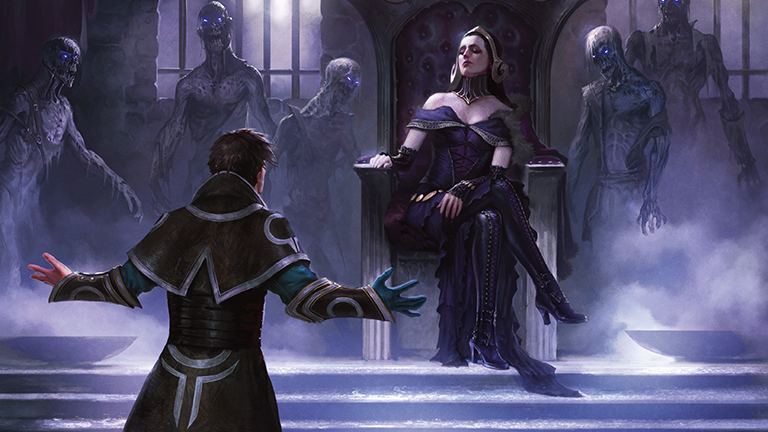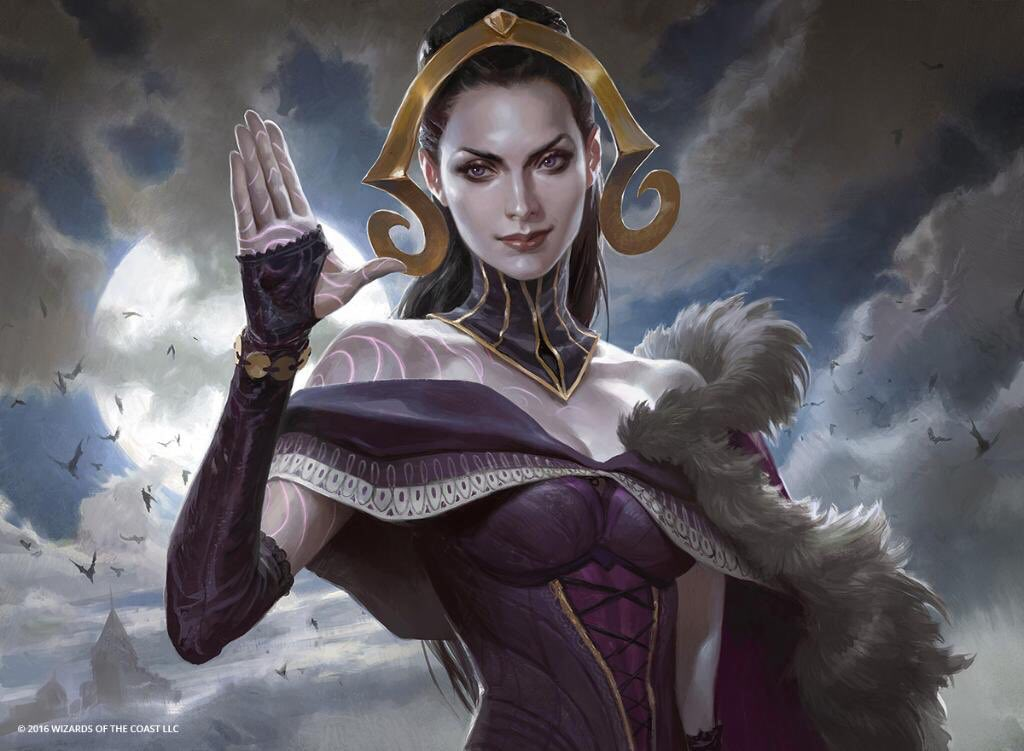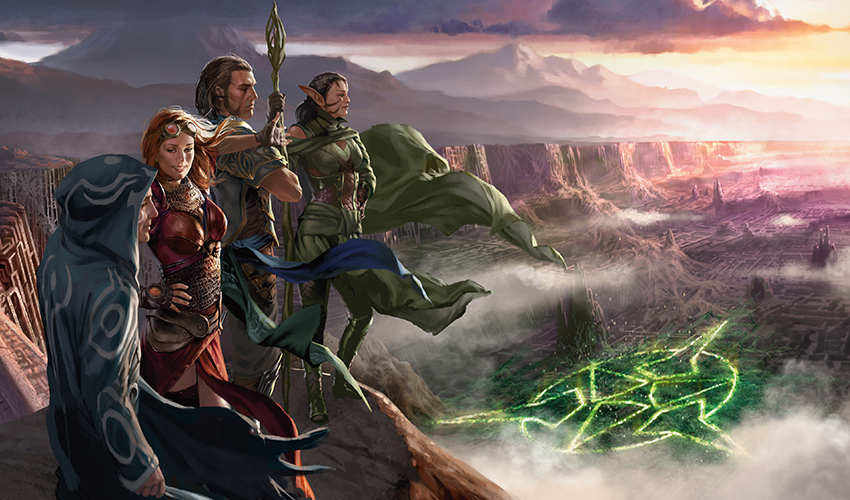This is part three of an article series analyzing the character of Jace Beleren. Be sure to read the first two parts as well.
Strap in, this is gonna get ugly. Liliana and Jace have a long and complicated history, all of it bad. Here are his first thoughts when she shows up unexpectedly at his doorstep on Ravnica:
He shouldn’t answer it. Whether it was really her or not, it was almost certainly a trap—and even if she didn’t have plans to betray him, again, life with Liliana had a way of turning to rot in a hurry. He knew better.
He sighed, rendered himself invisible, and summoned an illusionary duplicate. The duplicate opened the door, with a telekinetic nudge from him.
“Liliana?” he said, out of the duplicate’s mouth, painting a surprised look on its face. “What are—”
She casually walked right through the illusionary Jace.
“Can I come in?” she said over her shoulder.
Jace frowned, shoved the door shut, and dispelled his invisibility, his confused-looking illusionary double, and the teleportal for good measure. He hurried after her.
“What if I said no?”
“You didn’t,” she said.
Without hesitation, she bursts into his private sanctum, calls his illusory bluff, and seizes the initiative. It is a masterpiece of manipulation. She does not go to find him in the Hall of the Guildpact, where she would have to wait in line like any other claimant, beneath Lavinia’s harsh gaze. No, she wastes time and puts in the legwork to hunt down his backdoor because she is unwilling to give him an environmental advantage over her. In bypassing the Hall, she also bypasses his status as the Living Guildpact and all the accomplishments that lay behind that title. She is insulting him without saying a word, by treating him like the nervous boy who stared at her in awe when they first met.
And look what she does when he retains his suspicions:
She said nothing, but reached out, slowly, toward his face. Part of him wanted to flinch from her touch. Part of him wanted to do very much the opposite. He settled for holding still. But she did not touch him, only took the edge of his hood between two fingers and pushed it back. She appraised him for a moment.
“Appraised,” like a shrewd buyer examining an object on for sale. Here are two more descriptions from shortly after:
They were still standing, slightly too close to each other, in his messy front room.
He didn’t like looming over her, but he didn’t want to sit next to her, so he dragged a chair over from the table and sat.
That same, hyper-aware physicality is still present. Jace and Liliana have been intimate before, and she is relying on that memory to help overwhelm his better judgement. It’s a stellar performance, coldly calculated to prey on all of Jace’s psychological weaknesses, and she almost blows it:
“Alright,” he said. “You’re still alive, you’re still human, and you’re down two demons. So what’s the problem?”
She arched an eyebrow.
“Who said there’s a problem?”
“Lili, what are you doing here?”
She pouted.
“Can’t I just drop by to see an old friend?”
“Stop it,” he snapped. “We’ve been a lot of things, but we have never been friends.”
Playing a little too coy. She recovers, leaning on her audacity and presumption, but Jace does have a limit with her. Liliana has a hold on him, but he is no meek thrall. She talks him into buying her lunch, and there, her gambits fail her. Gideon shows up to ask for help, and Jace chooses him over her.
She stopped and faced him, eyes bright with rage.
“I seek you out after all this time,” she said. “I open up to you. And now, after all we’ve been through together, you’re ready to walk off with some undercooked side of beef from Sunhome, just because he asked?”
Wow, she packs a lot of cunning in two sentences. “I seek you out after all this time”—after she betrayed him and left him for dead. She plays games with him, trespasses in his home, offers no apology, and then pressures him into buying her lunch. Calling Gideon an “undercooked side of beef” cuts through, however. She knows Gideon is bigger and stronger than Jace, and she knows exactly how much that bothers him. The only way Jace’s pride can handle that is if he casts Gideon as a dumb meathead, and she knows that too.
It’s a brilliant salvo, all the more for being cooked up on the spot, but it doesn’t work. Jace is not unmoved by her pleas, but is not willing to put her desires before the situation on Zendikar. Liliana knows Jace so well, so what did she miss?
“You’re out of your mind,” she said. “I’ve got demons to kill.”
“Fine,” said Jace. “Good luck with that. And Liliana?”
She waited.
“He asked.”
Liliana knows a lot about Jace, but she continually underestimates him. He is not the scared boy she would belittle him down into being. And Liliana didn’t get that knowledge without exposing some of her own weaknesses: she is completely unwilling to swallow her pride enough to ask for his help, and he knows. I think some people perceive Jace as under Liliana’s thumb, but that’s not true. Jace and Liliana’s confrontations consistently end in bitter, painful draws. While that may not sound like much, it is far better than most people manage when they go up against her.

Their next meeting on Innistrad is fittingly titled Unwelcome. Jace has come to Liliana to ask for help. She corners him into admitting he wants something from her:
“Prove me wrong,” she said. She stood and raised her head proudly. “I refuse your freely given aid, Jace Beleren. If you’re here to help me and ask nothing in exchange, turn around and walk out that door.”
Jace said nothing. Even if it was a bluff, he couldn’t afford to call it.
“All right then,” said Liliana, draping herself back over her throne. “Now that we both know exactly how much our personal history means to us . . . what can I do for you, dear?”
But Jace soon gains the upper hand. He tells her he’s after Sorin Markov, an extremely dangerous vampire. Liliana legitimately freaks out, and she tries to talk him out of it. When that doesn’t work, she orders her zombies to seize him as a demonstration of his powerlessness against the undead. Jace is undeterred:
“This is a dead end,” she said. “Go home, Jace. I’m sure you’ve got forms to file.”
Undead hands released him, and he rose, rubbing his throat. He felt the sudden need for a bath.
“I’m sorry for bothering you,” he croaked. “I’ll head to Markov Manor on my own, then.”
He turned toward the door.
“Nine hells, you are a reckless fool!”
He turned back to her.
“Of course I am,” he said. “That’s how I got tangled up with you. I’ll be going now.”
He turned to leave again, trying not to think about moonlight and bloody muzzles and Liliana’s eyes and the fact that his guide and his horse were both gone.
“Don’t be stupid,” she said. “You can leave in the morning.”
Liliana cracks first, unwilling to let him walk outside to his death. She tries to cover it up, but Jace walks away with everything here: he gets the information he needs, plus safe refuge for the night.
These games are typical of Jace and Liliana, but danger brings out more sincerity in both of them. Jace’s explorations go poorly and he starts to lose his sanity. In this state, he storms back to Liliana, vengeful. This time, Jace is playing for keeps.
Liliana had never actually seen Jace lose a fight he’d had time to prepare for.
“Get out of my house,” said Liliana.
“Why?” said Jace. “Am I scaring you?”
His eyes glinted beneath his hood.
“I certainly hope this display is frightening you,” said the Raven Man. “This isn’t like him.”
Jace is wounded and seems determined to find his death in Thraben. Liliana tries every trick in the book to get him to stay, without admitting to Jace or herself that she cares about him. The whole story provides excellent insight into their dysfunctional relationship. But this moment, this moment right here? This is the crown jewel of dysfunction. Liliana says that logically, killing him is the smartest play for her, so Jace grabs her hand, places it over his heart, and says “Do it.” With her hand resting lightly on his chest, she says this:
“You ever have a pet when you were a kid?” she asked instead. “A mouse or something?”
Her hand still crackled with carefully contained necromancy.
“I . . . I don’t remember when I was a kid. Much anyway.” He glanced down at her hand in almost childlike confusion. “W-why?”
“Humor me,” she said. “You must have taken care of an animal at some point.”
“There was . . . a dog,” he said. “In Ovitzia. I fed her scraps. Scratched her head when I went by.”
“What happened to the dog?”
“One day I came by and she was—” He stopped, swallowed, blinked. “Why are you asking me this?”
“How did you feel?”
“Sad,” he said. “Pretty devastated, actually, for a while. But I—I got over it, obviously.”
“Why?”
“Because . . . because I always knew it was going to end that way. Didn’t think about it, but I knew. I—Lili, why?”
“Because that’s how I’ll feel when you’re dead, you idiot,” she said. “Sad. For a while. And then I’ll get over it. Because I always knew it was going to end that way. So don’t lean too hard on my good intentions toward you. One of these days you’ll find they no longer support your weight.”
Unbelievably cruel. This conversation will linger with Jace for some time. Liliana is not entirely truthful, I suspect, but that is for another post. For now the most important thing about this conversation is Jace’s response:
“I’m probably going to die in Thraben,” he said. “Sorry in advance for that. But somebody has to know what’s going on.”
He is not dissuaded. She gave it her best shot—the most vicious she could be while trying to keep him safe. It did not work. Instead, we are left with another bitter, painful draw.

Eventually, Liliana joins the Gatewatch for her own reasons, and we see these same patterns repeat. In this instance, the Gatewatch are preparing to welcome a dignitary.
Jace looked up at the noise of her chair. “You’re early?” He sounded aghast. She was professionally affronted.
“No. Everyone else is later than me.” She cast a critical eye up and down his form. Firm, fit, alert, hair combed. She mentally called bull on it. “You can drop the glamour, dear. No one cares.”
He sighed, and shimmered as his illusion dropped. There was the real Jace; paler, hair rumpled, eyes sunken from late nights, and his chin tinted by the adorable peach fuzz that almost counted as a someday-maybe beard.
“Vanity?” she said. “That’s not like you.”
He raked a hand back through his hair, which did nothing to calm its random angles. “I should be at my best for team meetings. Project leadership. Confidence. The idea that I know what the hell I’m doing. And why am I telling you this?” He looked annoyed at himself.
She raised one ivory shoulder in a careless shrug. “Who else knows you well enough to understand?”
Liliana knows Jace, and she uses that knowledge to cut him more deeply than anyone else could. Jace is trying to fulfill his responsibilities, to mature and grow as a person. But in his heart, he thinks of himself as a fraud and as for him to mature past loser; and she will never let him forget it. Why? Because for Jace to mature he must grow past her. Liliana is not psychologically equipped to handle that.
The leadership dispute between Jace and Gideon happens here, and Liliana is the one who steps in to rescue them. When the dignitary leaves, she tries to preen over it.
Liliana placed herself between the table and the door to Jace’s office as he gathered his paperwork. He scowled to see her waiting, lowered his chin, and marched past her looking into the distance. She smiled benignly. Magnanimously. “In the future, my dear, maybe you should leave the talking to me?”
“I hate it when you do that,” Jace said, low and colder than she thought she’d earned. “When you walk in and take over. Like you own everything and everyone. Then expect me to thank you.” He turned his shoulder to her and brushed past.
Her words came out by reflex, unbidden; pain for pain. She breathed into the collapsing space between them, “I remember when you enjoyed that.”
Then he was gone, leaving behind only his angry words, each a nail of ice pounded into her heart.
Pain for pain—that sounds about right. Jace once worshipped her, admired the way she could effortlessly take command of a situation. No longer.
Liliana Vess is cunning, powerful, confident, poised, ambitious, and breathtakingly beautiful. She has known Jace longer and more intimately than anyone else in his life. For a man with no memory and no self-confidence, Liliana is irreplaceable. He can’t let her go, because even if he knows she only pretends to care about him, that is still more than anyone else has ever done. Liliana has preyed upon Jace all along, tossing him the barest scraps of affection to keep him attached. It makes sense that as Jace grows closer to the rest of the Gatewatch and gains their acceptance and recognition, her hold on him would begin to weaken.

Late in the Amonkhet storyline, Liliana is talking to herself, and we get some retroactive news about their relationship:
“Affection is manipulation,” said Liliana. “It worked, didn’t it?”
“On whom?” said the Raven Man. “You and Jace have split a bottle and reminisced about old times more than once. You’re telling me that was just you getting your hooks back into him?”
It had happened, a time or three, at her private residence on Ravnica after she joined the Gatewatch. Then Gideon had remarked acidly at some strategy meeting about being unable to find Jace in the early hours of the morning, and that had been the quiet, unremarked-upon end of the thing.
“That,” said Liliana, “is none of your damned business.”
How interesting. A single comment was enough for them to end the affair, for both of them. That indicates a startling lack of confidence, and a need for secrecy. What is Jace afraid of? That the others will find out, and whisper behind his back that Liliana has her hooks in him again? I don’t think he fears them knowing it so much as he fears their response—because he knows they are right. Well, mostly right. This is a self-evidently toxic romance, but also kind of a sad one, which I suppose is appropriate.

This is our Esper triad. Jace is a scarred, battered survivor with the worst case of impostor syndrome imaginable. A part of him wants to become more, and Gideon is there to try and lift him up. The rest of him is afraid of failure, and Liliana is ever eager to pull him down. His life is controlled by the expectations of the people around him, with no input or agency of his own.
Jace Beleren, the real Jace Beleren, is not some smarmy mind-mage countering spells and dishing out quips. I’d be astonished if you could find a single instance of that anywhere in the lore. Jace Beleren is a tragic figure, someone gifted with extraordinary powers that he has been taught to be ashamed of. Someone who allows others to define him. A deeply unhappy man with the weight of a plane resting squarely on his shoulders, who would give anything to be loved for the person he is.
Pre-Ixalan, at least.
Jace’s story is not over, and neither is our analysis. Further articles will chart out Jace’s splendid Ixalan evolution. For now, thank you for making it all the way to the end! I hope it you gave you some new insight into Magic’s most controversial character. And of course, if you have a thought to share or an alternate opinion, please feel free to start a conversation.
David Walley is only a recent fan of Magic: The Gathering, but a lifelong spectator to stories. After discovering the Magic Story earlier this year, he was greatly impressed by both its strength and subtlety. In his articles, he endeavors to expand the Vorthos community by showcasing the story’s excellence to the average Magic fan.

